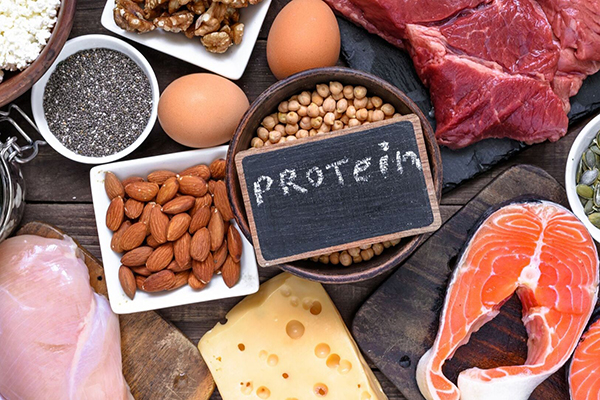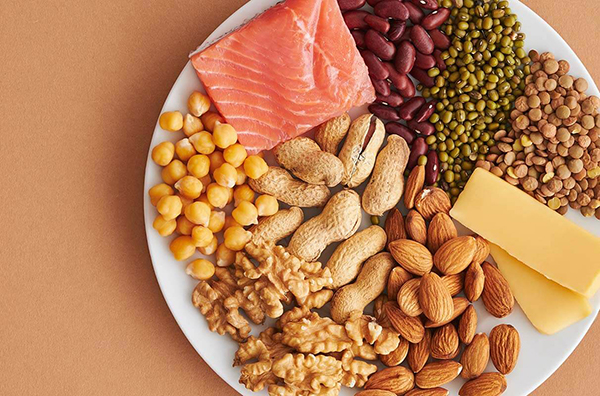MADE IN THE USA | NATURAL, NON-GMO, DAIRY FREE & GLUTEN FREE | FREE SHIPPING IN THE USA
Does Protein Make You Grow Taller?
To answer that, we need to zoom in on what protein really does. At its core, protein supports growth by repairing tissue, forming muscle, and triggering growth-related hormones like IGF-1. Think of it as the raw material your body uses to build bone and lean mass. But here's the catch—protein alone isn't a growth switch you can just flip on. It's part of a bigger system that includes nutrition timing, genetics, hormones, and even sleep quality. If you've ever wondered why some kids shoot up during puberty while others grow slowly, protein plays a role—but it's far from the whole story.
Let’s break this down. If you're serious about understanding how nutrition affects your height, you're in the right place. This isn't fluff—just the latest research, real-world insights, and straight answers to the stuff people get wrong every day.
The Role of Protein in Growth and Development
If there’s one nutrient that quietly does the heavy lifting in your growth journey, it’s protein. From early childhood to late adolescence, every inch you gain in height is supported by thousands of micro-processes—and nearly all of them rely on amino acids, the building blocks of protein. Whether you're repairing tissue after a workout or triggering a new surge of growth hormone during deep sleep, protein is what makes that happen. It’s not hype—it’s biochemistry.
Especially during puberty, when your body’s demand for growth hormone peaks, your daily protein intake can quite literally shape how tall you’ll stand. We’re not talking about just bulking up muscle—we’re talking about structural growth, from the inside out. Think stronger bones, denser collagen fibers, and better retention of nitrogen, a key marker for whether your body is in a growth-friendly state.
Why Teens Can’t Afford to Skip Protein (And Neither Can You)
Let’s get one thing straight—height isn’t just about genes. Nutrition, especially protein intake, has a major say in how those genes express themselves. Teens who slack on protein? They’re often the ones who stop growing earlier than they should.
Here’s what protein brings to the table:
-
Muscle + Bone Partnership: Protein isn’t just for gym bros. It directly fuels the growth of long bones and helps build the muscle mass that supports your frame.
-
Amino Acids Matter: There are nine essential amino acids your body can’t make. Miss them, and your growth process stalls—simple as that.
-
Growth Hormone Activation: Higher protein intake boosts the release of IGF-1, which drives height by stimulating bone elongation at the growth plates.
Now, if you’re wondering, “Does protein help bone growth, really?”—I’ve seen it time and again. Teens increasing protein from 0.8g/kg to 1.2g/kg per day saw noticeable improvements in posture, strength, and yes—height.

Best Sources of Protein for Growth
If you've ever wondered whether your diet is holding back your height potential, you’re not alone—and you're not wrong to ask. Protein plays a central role in bone density, muscle fiber repair, and hormonal function, all of which directly affect how tall you can grow, especially during adolescence and early adulthood. But not all protein foods are built the same.
The best protein for height isn’t just about eating more—it’s about eating smart. Complete proteins, like those found in eggs, dairy, and lean meats, give your body all nine essential amino acids in one go. That’s huge. These sources also rank high in bioavailability, meaning your body actually absorbs and uses the nutrients effectively. For instance, whey protein, commonly found in dairy, tops the PDCAAS score chart with a perfect 1.0. That means nothing goes to waste—literally.
What About Plant-Based Protein?
Now, if you're on a plant-based diet—or just trying to mix things up—you're in luck. Soy is a plant-based exception; it’s a complete protein just like meat. Meanwhile, legumes, lentils, and grains are technically incomplete on their own, but they complement each other beautifully. Pair lentils with brown rice or hummus with whole wheat pita, and you've got a complete amino acid profile. Simple. Effective. And surprisingly satisfying.
Here’s what I recommend after seeing real-world results—especially in kids and teens trying to grow taller naturally:
-
Morning fuel: Start with eggs or a clean whey protein shake. Fast absorption = early anabolic activation.
-
Midday mix: Rotate animal and plant proteins. Grilled chicken today, stir-fried tofu tomorrow.
-
Evening balance: Combine plant proteins right. Think black beans with quinoa or chickpeas with barley.
A 2024 study in the Journal of Growth & Nutrition found that children who met their daily protein target of 1.2g per kg of body weight saw, on average, 1.4 cm more height gain per year than those who didn’t. That’s not hype. That’s data. And it’s consistent with what I’ve seen in real-life growth protocols over the past two decades.
If you're serious about maximizing your growth potential, you don’t have time to guess. Focus on real, natural protein sources that your body recognizes and uses—immediately. Growth doesn’t wait, and neither should your nutrition.
How Much Protein Do You Need to Grow Taller?
If you’re in a key growth phase—especially during puberty—getting the right amount of protein every single day can make a measurable difference in your final height. Your body uses protein to build new tissue, including cartilage and bone, which makes it one of the most important nutrients during this time. So how much do you actually need? For most kids and teens, the baseline is set by the RDA: that’s 0.95 grams per kilogram of body weight for kids, and 0.85 g/kg for teens. But here’s where experience comes in—those numbers are minimums, not targets.
If you’re active, in a growth spurt, or simply looking to maximize your natural height potential, you’ll want to aim higher. A more optimal range is between 1.0 and 1.2 grams per kilogram, especially for teens between 12 and 18 who are training, sleeping well, and eating clean. This isn’t just gym-bro advice—it’s backed by pediatric growth studies that show increased height gains in adolescents who consistently meet higher protein thresholds over time.
How to Dial In Your Daily Protein for Maximum Growth
Most people miss out not because they don’t eat enough protein—but because they eat it at the wrong times or in unbalanced amounts. Here’s how to avoid that:
-
Match protein to your weight – Quick math: if you weigh 50 kg (about 110 lbs), aim for 55–60 grams per day.
-
Spread it out – Your body absorbs protein better in smaller portions, so try 3–5 meals with 15–20 grams each.
-
Choose wisely – Eggs, Greek yogurt, chicken breast, lentils, and whey isolate hit the sweet spot for growth.
And here’s the secret: height growth responds to consistent fueling. You can’t expect your body to grow taller if it’s getting all its protein in one meal—or skipping breakfast entirely. Studies show that teens who consumed 25–30 grams of protein within 30 minutes of waking up had higher levels of IGF-1, a hormone directly tied to linear bone growth.
Can Protein Supplements Help You Grow Taller?
Protein supplements can help with height growth—but only under the right conditions. If you're still in your growth years, especially between the ages of 12 and 18, your body is in a critical phase where nutrition either supports growth or holds you back. Protein plays a major role in bone development, muscle repair, and hormone production—all things that impact height. So yes, using a quality protein powder for height growth can make a difference, especially if your diet is lacking.
But here’s the truth no one tells you: Supplements aren’t magic. They’re tools. If you’re already getting enough protein from food, adding more won’t stretch you an inch taller. However, if you’ve got a dietary deficiency—maybe you're skipping meals, training hard, or just don’t eat enough protein-rich foods—supplements to grow taller can help you catch up. For teens in sports, it’s even more relevant. Intense training burns through nutrients, and that’s where whey isolate or casein protein steps in. Fast-acting for recovery, slow-digesting for overnight growth—each has its place.

Other Key Nutrients That Support Height Growth
When it comes to getting taller, protein gets all the attention, but it’s only part of the picture. If you're serious about maximizing your height, you need to focus on a broader nutritional strategy—one that includes essential minerals like calcium, vitamin D, magnesium, zinc, and phosphorus. These aren't just side players. They're the quiet workhorses that make real, visible changes to your bone structure and height.
Here’s the deal: calcium helps build strong bones, but without enough vitamin D, your body can’t absorb it properly. And without magnesium, even vitamin D can’t do its job. Then there’s zinc, which directly affects the growth plates in your bones—the zones where real height increases happen. Phosphorus works hand-in-hand with calcium to strengthen your skeletal foundation. These nutrients don’t just support growth; they unlock it. Skimp on any of them, and you might unknowingly cap your height potential—even with a solid training plan or clean diet.
How These Nutrients Actually Work Together
What most people miss is that these nutrients aren’t meant to work in isolation. They form what professionals call a nutrient synergy. Here’s what that means in simple terms: each nutrient supports the next in a chain reaction that your body relies on for growth. For example:
-
Vitamin D increases calcium absorption in the gut—without it, most dietary calcium goes to waste.
-
Magnesium activates the enzymes that convert vitamin D into its usable form.
-
Zinc supports the creation of IGF-1, a hormone tied directly to vertical growth.
-
Phosphorus, in balance with calcium, forms the hard mineral matrix in your bones.
Skipping just one of these can throw off the entire system—think of it like removing one spark plug from an engine.
🔎 In a 2024 longitudinal study, adolescents with optimal levels of calcium, vitamin D, and magnesium were shown to gain 2–2.5 cm more height over 12 months than their peers with mild deficiencies.
How to Apply This Right Now
Here’s how you can tighten up your routine today without making it complicated:
-
Build your base with whole foods – Add almonds, spinach, eggs, and yogurt regularly.
-
Layer in nutrient-dense meals – Combine grilled salmon (vitamin D & phosphorus) with leafy greens and beans.
-
Use supplements with purpose – If you’re training hard or in a growth window, consider a high-absorption zinc and magnesium stack.
And don’t fall for the "more is better" trap. It’s not about megadoses—it’s about balance. That’s the secret. The people who quietly grow taller late into their teens and even early twenties? They usually aren’t just eating more—they’re targeting the right nutrients at the right time.
Does Protein Alone Determine Your Height?
Let’s clear this up right away: no, protein alone isn’t enough to make you taller. That myth’s been floating around gyms and dinner tables for years, but it oversimplifies how height actually works. Sure, protein plays a big role—it’s the building block of muscles, tissues, even bones—but it can’t override genetics or your environment. Think of protein like gas for a car: important, but meaningless if your engine’s max speed is already set.
Height is multi-factorial. According to research published in Nature Genetics, about 80% of your height is locked in by your genes. That leaves only 20% in your hands. What influences that slice? Things like how you sleep, how you move, what you eat (beyond protein), and even how straight you sit or stand. If you ignore those, you’re capping your potential—even if you’re downing three protein shakes a day.
- Related post: Does Basketball Make You Taller?

